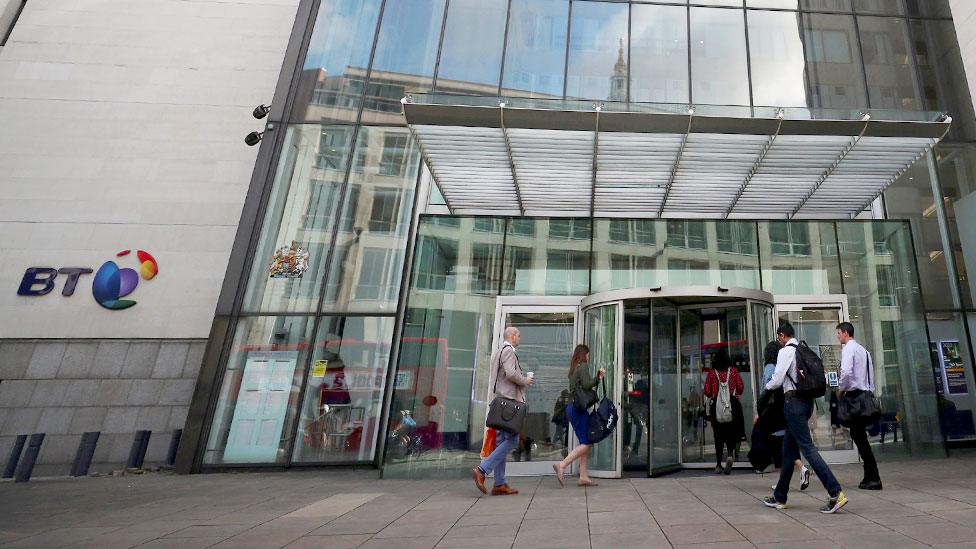'I got paid less than my colleagues for doing the same work'
- Published

Connor McCann works in a BT call centre in Canterbury but despite doing the same role as his colleagues was paid thousands less a year.
That's because the 24-year-old was employed by agency Manpower and not BT.
"It didn't matter how good you are at your job, you're still being paid less than your colleagues," he said.
New research finds the 950,000 UK workers employed through an agency, like Mr McCann, earn more than £400 a year less than those employed directly.
The Resolution Foundation figure includes wages as well as other benefits such as unclaimed holiday or sick pay, and deductions for uniforms.
That's more than the number of people on zero-hours contracts, according to the think-tank.
"I was speaking to the exact same customers and selling the exact same products, so it felt really unfair," Mr McCann said.
"It meant I struggled to move out of my family home. I struggled with my bills and my social life, too."
'Unaware of rights'
Lindsay Judge, senior policy analyst at the Resolution Foundation, said: "Agency work has been largely absent from recent discussions about the modern world of work, despite almost a million people being employed via an agency.
"As well as reforming poor regulation, the government should stamp out unlawful practices through tougher, targeted enforcement work."
The foundation is concerned that many agency staff are unaware of their contract rights, with £500m in unpaid holiday pay and 500,000 eligible for pension auto-enrolment who are not signed up to schemes.
Its research, which is based on official ONS data, found that agency staff are more likely to be employed in lower wage roles across a wide range of professions.
Further, when the Resolution Foundation compared the pay of two similar individuals of the same age and background, working in the same kind of business, those employed by an agency received 22p an hour less than those directly employed.
That adds up to £422 over the course of a year.

Connor McCann works for a BT call centre in Canterbury
The think-tank wants contracts - so-called Pay Between Assignment - to be outlawed because they give firms a legal way to avoid equal pay obligations.
It also argues that specialist government taskforces should be set up in hotspots such as Barking and Dagenham, Leicester and North East Lincolnshire, where there is a high proportion of agency work.
'Vital work'
The Recruitment and Employment Confederation, which represents the industry, says that agency work is vital to both workers and companies.
"While very short-term temps can be paid differently to long-term employees of a company, the law rightly states that after 12 weeks on the job pay should be the same," a spokesperson said.
"With many assignments lasting a few days or weeks, it is no surprise that some pay differences exist when comparing these temps with experienced staff who have an ongoing relationship with the business."
The REC's latest survey data showed two thirds of employers paid agency workers the same or more than permanent staff.
A spokesperson for Manpower says the company "ensures that it is always compliant with appropriate regulations and best practice and welcomes any move by Government to stamp out malpractice in support of temporary workers."
There has been a happy ending for Mr McCann at least. The Communications Union worked with Manpower and BT to bring the team of agency workers in-house, which increased his salary from about £15,000 to more than £21,000.
"It's the difference between going out to get a coffee or getting a taxi home on a night out, or even going to see family back in Dublin," Mr McCann.
"Moving on to a contract meant I could start putting money aside and put more into a pension and think about my long-term future."
What are your rights as a worker?
Everyone should be paid National Minimum or Living Wage - depending on age
All workers are eligible for statutory sick, holiday and maternity or paternity pay
Everyone is protected from unlawful deductions from wages and discrimination
Everyone is entitled to be enrolled into a pension if they meet the criteria
No one should work more than 48 hours a week unless they opt out
No one should be charged direct or indirect fees for finding a job
No one should be prevented from working elsewhere
What rights do agency workers have?
From day one, agency workers should:
Get access to the same facilities such as canteens, crèche or car parks
Be made aware of any job vacancies
After 12 weeks, agency workers should:
Get the equal pay as a permanent employee
Get equal treatment on breaks, holidays and hours
- Published7 February 2018

- Published24 February 2017
